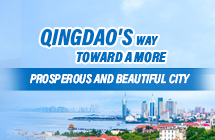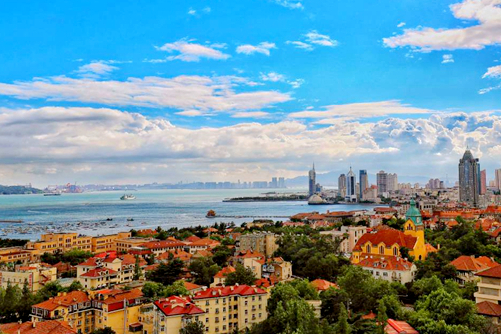City welcomes success on the winds of change

Located at the geographical center of Northeast Asia, Qingdao, East China's Shandong province hopes to march in new advance with a series of moves. Photos provided to China Daily
Stylish Qingdao is looking for a new round of economic growth through a series of efforts in fashion, marine industries
The government of Qingdao in East China's Shandong province has vowed to continue the coastal city's economic success with a new round of projects and developments.
As a geographical center of Northeast Asia, Qingdao, home to 10 million people, achieved a gross domestic product of 1.2 trillion yuan ($178.8 billion) in 2018, as well as an added value of over 300 billion yuan accounting for 25.5 percent of the total.
The city is playing a lead role in opening up Shandong province to the outside world, according to the government. To further this, Qingdao will cooperate with the neighboring Beijing-Tianjin-Hebei region, as well as Japan, South Korea and the rest of Northeast Asia.
The city is to become a new strategic hub in the north of the Yangtze River for the country's new round of opening-up, said Wang Qingxian, Party secretary of Qingdao.
Qingdao Port is allowing the city to speed faster toward its goal of becoming an innovation center for international shipping, trade and finance, as well as promoting closer cooperation with global shipping and ports.
The city will develop modern shipping and trade service industry clusters with finance at their core so as to maximize its positive effect on Qingdao's development, Wang said.
The Qingdao Jiaodong International Airport, which will come into service in September, is expected to act as a regional gateway airport, catering to passengers traveling to and from Japan and South Korea, and an international air cargo pivot airport on the Bohai Rim, according to civil aviation experts.
Another area of expansion is the city's national-level Jiaodong Linkong Economic Zone, which is expected to become an important area for intelligent industries, with an industrial chain valued at more than 100 billion yuan.
The area along the Jiaodong Peninsula, which runs along the coast of Shandong, is also being utilized by Qingdao for urban agglomeration and cooperation with the surrounding cities such as Yantai, Weihai, Langfang and Rizhao. Development in this area is helping to improve the transport infrastructure network among these cities, the government said.
Qingdao is also following the lead of Shanghai's modern service industry, developing new areas of business such as finance, wealth services, exhibitions and property rights trading, among others. An improved service industry will help to facilitate more events such as exhibitions and conferences, which will provide a better platform for attracting investment to the area.
Manufacturing is an area that Qingdao has traditionally excelled in, but the city intends to continue to improve and upgrade.
Currently, the output value of its industrial chains in household appliances, automobiles, petrochemicals and food processing is more than 100 billion yuan, and world-class manufacturers such as Haier, Hisense, CRRC Qingdao Sifang and Tsingtao Beer are based in the city.
Qingdao is pushing hard for the transformation and upgrading of its traditional manufacturing industry, as a key part of the city's economic development. High-end manufacturing and artificial intelligence are playing leading roles in this.
In addition to maintaining its leading position in traditional manufacturing, the coastal city is also accelerating the development of its strengths in science and technology.
Qingdao is already a leading innovator in China in marine science and technology, home to nearly 30 percent of the country's academicians in marine-related fields, a large number of the high-end marine-related research and development platforms, such as the Pilot National Laboratory for Marine Science and Technology (Qingdao), Institute of Oceanology under the China Academy of Sciences, and China's manned deep-sea submersible Jiaolong. More than one fourth of city's output value stems from marine-related industries.
"Going forward, we will focus on a series of emerging fields, such as marine equipment, marine biomedicine, marine instrumentation, marine new materials, seawater desalination and marine new energy," Wang said.
"We will make breakthroughs in a number of frontier and key technologies, including deep-sea exploration, manned submarines, deep-sea space stations, marine innovative drugs and natural gas exploitation."
In recent years, the city has made efforts to develop its high-tech industries, next-generation IT, high-speed trains, biomedicine, new energy vehicles and industrial robots. New enterprises are developing rapidly in these areas.









 Play
Play  Play
Play